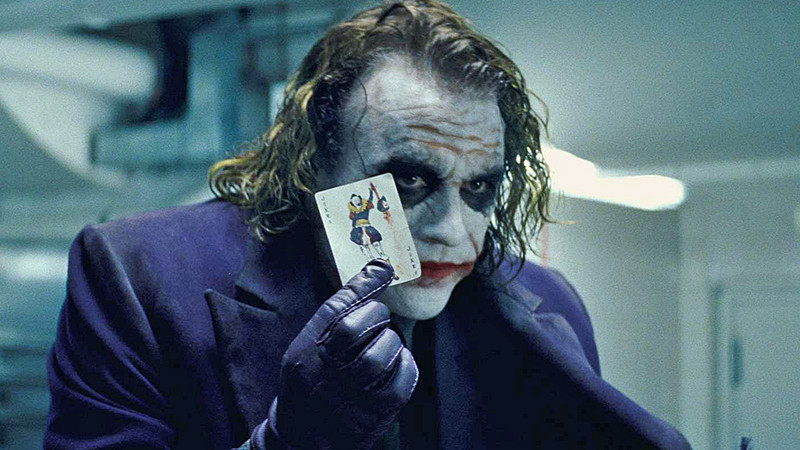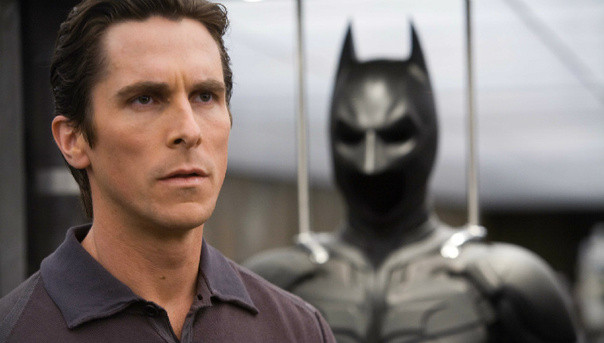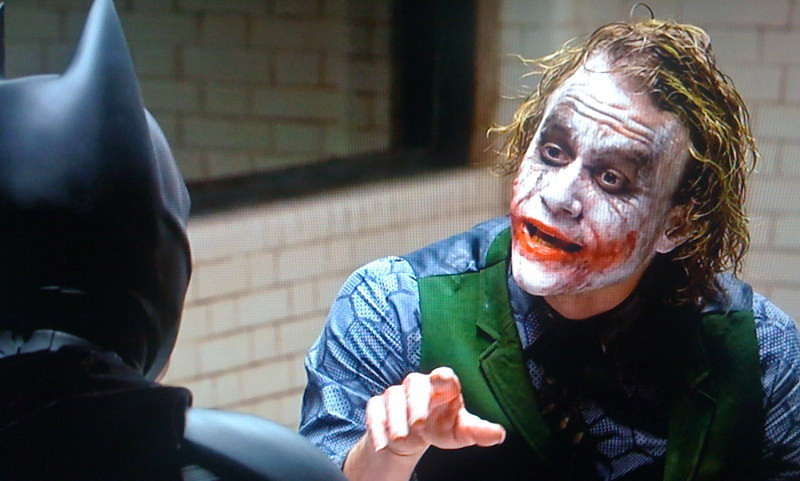
The Dark Knight, directed by Christopher Nolan, is, on the surface, a superhero noir. The Joker begins causing mischief, and good ole Batman must rise to the occasion in order to keep Gotham safe. Families depend on him, your average citizen believes in him to keep criminals in line. Underneath the simplistic moral notions of the average comic book movies, however, The Dark Knight seethes with tension. It is a gritty, salt-of-the-earth style of philosophical examination, delving into issues surrounding order and chaos, certainty and uncertainty, and moral ambiguities that have been the realm of human thought, debate, and human experience since before recorded history.
We get our first glimpse of this right away, at the end of the bank robbery that opens the film. The bank official, lying on the ground after being shot, shouts at Joker (Heath Ledger) while he’s walking away, “Criminals in this town used to believe in things. Honor. Respect. Look at you. What do you believe in huh? What do you believe in?!” The Joker responds, “I believe whatever doesn’t kill you simply makes you…stranger.” This is a clear reference to one of Friedrich Nietzsche’s most famous aphorisms. It tells us something about the character we have just met.
Every group of people has a code. In greater society, there are obvious rules that we all function around. Social niceties, if you will. We all take part in several different code systems every day. We have our home life, and often different codes for different members of the family. We have work, friends, acquaintances, retail stores, internet message boards, etc. As the bank official says, even criminals have a code. The mob needs to have a social system in order to function. If they didn’t, it would be every man for himself. Joker believes these codes to be mere ornament. He tells Batman (Christian Bale), “See their morals, their code, it’s a bad joke. Dropped at the first sign of trouble. They’re only as good as the world allows them to be. I’ll show ya. When the chips are down, these civilized people, they’ll eat each other. See, I’m not a monster. I’m just ahead of the curve.”
It makes sense that every group of humans to have evolved has these codes, because you need a way to determine how society should function so that it actually can. But what happens when a group of people have no code? When all rules go out the window? Chaos. The old types of criminals are out. The Joker is in.
Throughout the film Joker submits the people of Gotham to excruciating moral tests and puzzles. Near the end of the film, two boats are stranded out on the water and are unable to communicate with each other. One is filled with prison inmates and one is filled with residents. Both boats have bombs on them, for which the trigger is held by the people on the other boat. Joker gives them time to think about whether they want to blow up the other boat and live with being a murderer, but survive, or not blow it up and risk being killed themselves. If neither hits the trigger, then both will blow.

This is the classic prisoner’s dilemma. This dilemma is thus: say two people robbed a store and were caught, then put in separate rooms for interrogation. Both of them were offered the same deal. If they both confess then they will both go to prison but will do a small amount of time. If one confesses and implicate the other, and the other remains silent, the other will go to prison for a long time and they will walk free. If they both end up staying silent, they will still go to prison, but for not that long. The stakes in Gotham are much higher, obviously, but the principles and questions are the same.
The other interesting aspect of this moral qualm is the idea of initiating the death of several hundred people. Despite those in the film acting in a moral sense and not killing each other, lots of psychological research has been done on this question, and it seems to conflict with what happens on screen.
This is, more broadly, the trolley problem (again, this might not fit exactly, but it’s related). You have probably heard of it. It’s only one of the most famous philosophical thought experiments to have ever been devised. Imagine this: you are standing near some tracks with a lever next to you. You see a train coming and you notice down the tracks that there are five people who are not paying attention, and are going to be hit and die. The switch right next to you is connected to the tracks, and will switch the train to a new track where there is one person. This is the crux, will you hit the lever for the track to switch, killing one person but saving five? Research shows that most people would hit the lever.
Now consider a twist. You are standing on a bridge above the train tracks, and there is a very large person standing next to you. You have the option of pushing them off of the bridge to stop the train, and saving the five people further down the tracks. Would you push that person? Research shows that most people would not.
What is the difference between these two scenarios? They both end up with the same result. You have sacrificed one person to save five people, yet the difference between the scenarios is the way it is done. In one you pull a lever, and in the other you physically push a person.
The philosopher Philippa Foot, who developed the trolley problem, notes the distinction between the two. She said the reason is one is active while the other is passive. In hitting the lever you do not cause direct harm to a person; it can remain abstract. When you push a person off of the bridge to stop the trolley and save five people, you have entered the realm of direct consequences; it stays definitive in your senses. In other words, you can see exactly how your action caused the death of that person you pushed.
This research is often give in support of the idea that people are not rational; that our moral intuitions can be flexible and not consistent. In this version set up by Joker, we can see that those on both ships link hitting the button and saving their own lives with the murder of those on the other ship. They engage with a humanism that is deep and secure, understanding that their actions, even if they would be for the purpose of saving their lives, would ultimately end the lives of others. They are not willing to make that exchange.
The uncertainty and struggle that those on the ships experience is powerful. In a world where there is no objective moral standard, where ethics are debated and continually renegotiated, big questions like this are prone to anxiety and fear. Philosophers and political scientists have often linked the psychology of authoritarianism and its followers to an inability to deal with an incredibly complex reality. For a human being to outsource their thinking and their answers about all of human existence to someone else is a temptation many will give in to. Eric Hoffer, the social philosopher, wrote in his most famous book, The True Believer, “To obey is then the only firm point in a chaotic day-by-day existence.”

This is also a way to ease anxiety, which often comes out of an inability to control the world around us. One of the most universal cravings of humanity is the ability to control the events that happen around us, so that they happen the way we desire them to. Obviously, the world is too large, too random and chaotic to be able to effectively do this, not to mention that there are billions of people acting out their own wills, over which we have little to no control. Joker comments on this lack of control, telling Dent, “The mob has plans. The cops have plans. Gordon’s got plans. Ya know, they’re schemers. Schemers trying to control their little worlds. I’m not a schemer. I try to show the schemers how pathetic their attempts to control things really are.” The relationships between certainty and uncertainty, control and anxiety, have been teased out for centuries.
The existential novelist Fyodor Dostoyevsky wrote elegantly about these relationships throughout all of his work. His most famous novel, The Brothers Karamazov, was written as a serial piece in a magazine, and is now considered a classic of world literature. One of the most famous sections is called The Grand Inquisitor. In this chapter, Jesus has returned to Earth, and is going to be put to death the next day. Most of the text is the inquisitor speaking to Jesus about the role of freedom and conscience. The following section is the inquisitor speaking to Jesus:
“Without a stable conception of the object of life, man would not consent to go on living, and would rather destroy himself than remain on earth, though he had bread in abundance. That is true. But what happened? Instead of taking men’s freedom from them, thou didst make it greater than ever! Didst thou forget that man prefers peace, and even death, to freedom of choice in the knowledge of good and evil? Nothing is more seductive for man than his freedom of conscience, but nothing is a greater cause of suffering. And behold, instead of giving a firm foundation for setting the conscience of man at rest forever, Thou didst choose all that is exceptional, vague, and enigmatic; Thou didst choose what was utterly beyond the strength of men, acting as though Thou didst not love them at all – Thou, who didst come to give Thy life for them! Instead of taking possession of men’s freedom, Thou didst increase it, and burdened the spiritual kingdom of mankind with its sufferings forever.”
We see this in The Dark Knight. Think of each character in the roles they play. The Joker is chaos and uncertainty, Batman is order and certainty, and Dent (in the beginning, at least) represents the good, the White Knight. Joker (chaos) never really interacts with the public in the sense of being a villain everyone is afraid of, his only goal is to entangle himself with Batman (the sense of order). Batman allows himself to become the villain, and this allows Dent to be the good man that everyone looked up to and believe in. The certainty of that moral arrangement, Dent being good, Batman being bad, was worth the certainty and moral clarity to Batman, even though he was shunned and hunted afterwards. He accepted being the villain if it meant that the people of Gotham felt safe and knew who to blame. Alfred (Michael Caine) tells Rachel Dawes (Maggie Gyllenhaal), “Perhaps both Bruce and Mr. Dent believe that Batman stands for something more important than the whims of a terrorist, Ms. Dawes, even if everyone hates him for it. That’s a sacrifice he’s making, he’s not being a hero. He’s being something more.”
Humanity lives between these two poles, in the land of constantly negotiating truth and clarity, good and evil. If the world was only order, we would have the same old tried and rusty structures as have existed for all of history. This would be awful. With the amount of injustices in the world right now, to believe in a world that could not get better and be forced to stay the same is a world with nowhere to go, with no hope. The catch is that if we change the system too fast, or in the wrong way, then things could go wrong and get even worse, becoming chaos. Oscar Wilde wrote that, “Without order nothing can exist-without chaos nothing can evolve.” Where is the middle point? Where is the stability of the base of the mountain, but with enough variability and, yes, chaos, to give us new paths upon which we can find different peaks? Joker tells Batman, “I think you and I are destined to do this forever.” It is a tension that human beings have been negotiating for all of time.